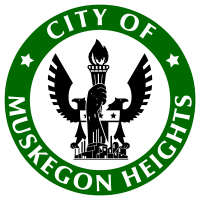COVID-19
City Hall Closed without appointment
Starting Monday, November 11, 2020, due to COVID-19, Muskegon Heights City Hall will be closed to anyone without an appointment.
Read MoreCITY OF MUSKEGON HEIGHTS ELECTRONIC CITY COUNCIL MEETINGS
Updated 04/20/2020 Electronically on the City of Muskegon Heights Government Facebook Page Reason for Electronic Meeting In accordance with the state and national directives, to mitigate the spread of COVID-19, protect the public health, and provide essential protections to vulnerable persons, it is crucial that all persons take steps to limit in-person contact. Paramount among…
Read MoreNOTICE TO RESIDENCES, RENTAL PROPERTIES, HOUSING COMPLEXES, AND OPEN BUSINESSES
Under the State of Emergency Declaration, the appropriate City staff have been empowered to enforcecompliance of the “cleanup and sanitation of all common areas.” To expedite the ability of law enforcement, code enforcement, and the Department of Public Works to monitor areas needing policing, sanitizing, cleanup, and attention for the general welfare and good health…
Read MoreNOTICE TO TAKEOUT AND CONVENIENCE STORE BUSINESSES
Under the State of Emergency Declaration, the appropriate City staff have been empowered to enforcecompliance of the 6’ Social Distancing Practice. Those establishments deemed to be essential may continue to operate, however they must take specific precautions to protect the health and welfare of their employees and the public. Thus, steps must be taken to…
Read MoreMayor Address COVID 19
In conjunction with this morning’s State of Emergency post here is a message from Mayor Walter Watt recorded yesterday evening.
Read MoreCity Manager’s Declaration of State of Emergency
CITY OF MUSKEGON HEIGHTS City Manager’s Declaration of State of Emergency Wednesday, April 01, 2020 At 9:00 pm On March 10, 2020, Governor Whitmer issued Executive Order No. 2020-04, declaring a state of emergency across the state of Michigan under section 1 of article 5 of the Michigan Constitution of 1963, the Emergency Management Act,…
Read MoreVital Funding for State’s Small Businesses Gains Michigan Strategic Fund Support
Economic assistance for small businesses around Michigan that have been negatively impacted by the COVID-19 virus gained approval from the Michigan Strategic Fund, the Michigan Economic Development Corporation announced today. “We understand small businesses across our state are facing unprecedented challenges as we take every step possible to mitigate the spread of coronavirus,” said Governor…
Read MoreCOVID-19 (Coronavirus) Information
The City of Muskegon Heights is proactively monitoring public health information for any potential implications of the COVID-19 (coronavirus) for our community. City Hall will be closed to visitors beginning Monday, March 16th through April 30, 2020 due to community mitigation strategies from MDHHS and to comply with Michigan Executive Order 2020-21. For the latest…
Read More